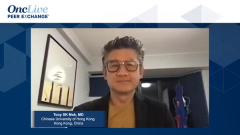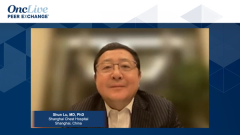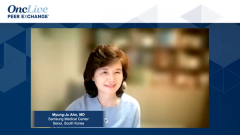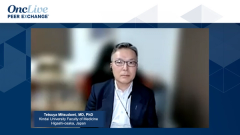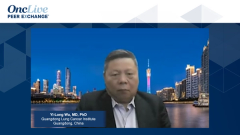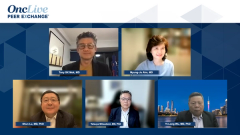
Regional Approaches to Frontline Treatment for EGFR+ Advanced NSCLC
A comprehensive discussion on frontline treatment options for patients with EGFR+ advanced non–small cell lung cancer.
Episodes in this series

Transcript:
Tony S.K. Mok, MD: All these familiar faces that I have in front of me are the people who put the EGFR mutation into clinical practice. Longtime collaborator with everyone I see here. It’s so good that we come back to talk about the role of TKI [tyrosine kinase inhibitor] in treatment of mutation of lung cancer. Let’s first talk about the first-line option. What will be the standard option in your country these days? Let’s start with Myung-Ju this time.
Myung-Ju Ahn, MD: In our country, unfortunately osimertinib is not reimbursed yet. It’s a shame. Currently gefitinib, afatinib, and tofacitinib is approved and reimbursed. And then ramucirumab plus erlotinib is not reimbursed or approved yet.
Tony S.K. Mok, MD: What about lazertinib? Lazertinib is a Korean third generation.
Myung-Ju Ahn, MD: Lazertinib is only for the second line for T790M mutation. Not the first line.
Tony S.K. Mok, MD: First line indication?
Myung-Ju Ahn, MD: Yes, first line is ongoing.
Tony S.K. Mok, MD: I see. That is interesting. I misunderstood that lazertinib was already approved as a first line.
Myung-Ju Ahn, MD: No, only T790M patient.
Tony S.K. Mok, MD: You actually don’t have a third generation TKI in the first line for the time being?
Myung-Ju Ahn, MD: Yes. It’s a shame.
Tony S.K. Mok, MD: Tetsuya, in Japan?
Tetsuya Mitsudomi, MD, PhD: In Japan, the guideline recommends osimertinib as a first line. But there are some concerns because the Japanese have said with the ADAURA study but still not great with the entire population. Especially in the case of the [INAUDIBLE] the benefits are limited. So some people like to use the gefitinib plus chemotherapy back in [INAUDIBLE] in combination with ramucirumab or Avastin [bevacizumab] like in [the] RELAY study or other Japanese studies.
Tony S.K. Mok, MD: There are doctors in Japan who use routinely of the gefitinib plus chemotherapy as a standard of care?
Tetsuya Mitsudomi, MD, PhD: I don’t know very well. But that group [of] people may use that routinely. Also, some people want to reserve the osimertinib as a later line to extend the TKI period as long as possible. So if they’re first-line afatinib produced the T790M you can switch to osimertinib. In that case you can have a very long TKI time. It's not possible to predict if we have to T790M in second line. That’s very difficult, but some people are trying to explore that possibility in the clinical trials. In general, the short answer is osimertinib.
Tony S.K. Mok, MD: And in China, Lu Shun?
Shun Lu, MD, PhD: In China, actually the first-, second-, and the third-generation TKI are all covered by the reimbursement in first line. Right now, more and more doctors will try osimertinib as found in the FLAURA study. Still, in some patients like the H5/L8 mutation will use placebo plus Avastin [bevacizumab] for this subgroup of patients. But osimertinib is widely used in first line.
Tony S.K. Mok, MD: Is it true that there’s 2 other third-generation TKI approved in China in the first line?
Shun Lu, MD, PhD: Maybe this month the almonertinib should be approved in first line. Within these 2 weeks.
Tony S.K. Mok, MD: Right. The randomized studies just came out that was quite positive.
Shun Lu, MD, PhD: Yes, but it’s not covered by the reimbursement. It should be, wait 1 year.
Tony S.K. Mok, MD: 1 year, I see.
Shun Lu, MD, PhD: Next year is negotiations.
Tony S.K. Mok, MD: Can you tell us a little more about this drug? Is it really equal to osimertinib? Is there any big significant difference we should be aware of?
Shun Lu, MD, PhD: In terms of effects, actually the HR [hazard ratio], [is] quite similar. ADAURA 0.46 but in this study 0.463. It’s nearly identical for HR. The toxicities are a little bit different. For the almonertinib more toxicity for the liver, but the ILD [interstitial lung disease] is lower. The toxicity profile is a little bit different. The general effects is quite similar.
Tony S.K. Mok, MD: Almonertinib is also a pyrimidine-based compound, right? It’s a similar molecule but just with a little different pharmacokinetics.
Shun Lu, MD, PhD: Exactly.
Tony S.K. Mok, MD: Myung-Ju, I want to throw it back to you. What happened to the patient that [had] brain metastases? What do you do? If you don’t have a third generation drug and a patient has significant brain metastases presentation, what do you do to the patient? Do you give whole brain RT [radiation therapy]?
Myung-Ju Ahn, MD: If the patient has a small lesion, less than 3-4, I will give [INAUDIBLE] for surgery or just give TKI. And then for multiple brain metastases, sometimes I give the whole round of radiation. But it depends. Mostly, the doctors suggest to give the TKI and follow with the brain MRI if they have no symptoms. Then if they develop the progression then we give the local therapy. It’s tough.
Tony S.K. Mok, MD: Yes. If I were the patient, I would be very unhappy knowing that the third generation can give such a better CNS [central nervous system] penetration.
Myung-Ju Ahn, MD: Exactly.
Transcript edited for clarity.


